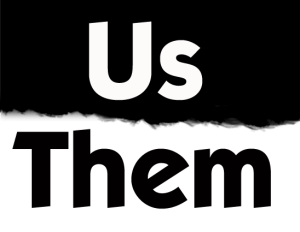Can Someone Who Is Not A Christian Be More “Christian” Than A Christian?

Can someone who is not a Christian be more “Christian” than a Christian?
In my last post I noted that recent Nobel Peace prize winner Malala Yousafzai’s “way” imitated that of Christ. A friend commented though that she wasn’t a “Christian” and was, in fact, a “Muslim”.
True…
This is obviously something that I have been thinking long and hard on for the last couple years or so…
What does it really mean to believe in Jesus?
I recently taught at a Sunday service where I asked by a show of hands who had friends, co-workers, or family that were not Christian but acted more in a way that Jesus taught than Christians they knew.
Pretty much every hand went up…
Which begs the question, “Can following “the Way” Jesus taught us be separate from being a Christian?
“Christian” as a tribal identity
The term “Christian” was first used in the book of Acts to denote followers of “The Way”. It was meant to suggest someone who is imitating Christ. Through the centuries though politics and religion mixed with history to transform the term “Christian” into a type of tribal identity.
It was used to help separate “us” from “them”.
Today when someone says they are a Christian I can guess within a certain spectrum what beliefs they affirm (but may not practice), the language they speak, and the religious culture they occupy. I can assume certain rituals, norms, and practices but the one thing I realize I can not be sure of.
I can no longer assume a “Christian” is a follower of Jesus!
As Benjamin Corey states in his book Undiluted:
When we look at the undiluted radical message of Jesus, we see that it was never about wearing a theological label, subscribing to a particular theological structure, or even about becoming a Christian. The undiluted message of Jesus is, and always has been, a straightforward invitation to follow him, and to learn to be like him.
Undiluted: Rediscovering the Radical Message of Jesus pg 33
When Jesus gives the parable of the Sheep and the Goats, those who are approved by the king were surprised to hear the king counted their good works as done for him.
“Then the King will say to those on his right, ‘Come, you who are blessed by my Father; take your inheritance, the kingdom prepared for you since the creation of the world. For I was hungry and you gave me something to eat, I was thirsty and you gave me something to drink, I was a stranger and you invited me in, I needed clothes and you clothed me, I was sick and you looked after me, I was in prison and you came to visit me.’
“Then the righteous will answer him, ‘Lord, when did we see you hungry and feed you, or thirsty and give you something to drink? When did we see you a stranger and invite you in, or needing clothes and clothe you? When did we see you sick or in prison and go to visit you?’
“The King will reply, ‘Truly I tell you, whatever you did for one of the least of these brothers and sisters of mine, you did for me.’
Matthew 25: 34-40
Wait a minute! Is Jesus really suggesting that people could be following in his “Way” and don’t even fully realise who is really on the receiving end of those acts of goodness and life?
Seems to be…
That notion really offends and irritates a lot of people because it means that some of “us” could really be part of “them”…and some of “them” could really be part of “us”.
And many Christians don’t even want to contemplate that.
But Jesus said there are a couple ways of identifying who are his disciples, or followers of “the Way”…
* the bearing of fruit: (John 15:8) People who are following Jesus are eating from the Tree of Life. If they are they will produce fruit after that kind. Life giving fruit! Life that can be given to others for strength and nourishment. When we see people bringing life, grace, and peace to their environment we can guess they are about the Father’s business.
* the love a person has for people in general: (John 13:35) Jesus said himself if you want to know who is “with me” look at the way they treat people in general. Do they love others?
When Jesus returns it will be interesting (and probably terrifying) to see who he points to and says, “That one is from my Father’s Kingdom, now enter into His house prepared for you”
I think we will be VERY surprised indeed!
4 comments
Comments are closed.
Related
-
Uncategorized
If Jesus Is The Word Where Does That Leave The Bible?
By Steve -
Uncategorized
Jay Bakker and Learning To “Smell” Like Jesus
By Steve -
Uncategorized
Love Does: The Extraordinary Life of Bob Goff
By Steve -
Uncategorized
You Have Enough Faith…But Where Is It?
By Steve -
Uncategorized
More “Left Behind”: Thoughts on Raptures, Resurrections, and Turning The Prince of Peace into A God of War
By Steve -
Uncategorized
My Greek Adventure Pt. 2
By Steve -
In Memorium / Uncategorized
My Memories Of Pastor Samuel Lamb
By Steve -
Uncategorized
Rob Bell & 9 Things Evangelicals Should Never Do: A Response To R.C. Sproul
By Steve -
Uncategorized
“Holy Ghosts” With Peter Rollins Pt. 2
By Steve -
Uncategorized
“How Do I Get Close to God?”
By Steve



is this not the problem, though, to begin with? That “no one is righteous, not even one”? that “all our good works are but filthy rags”? that “that which I want to do I do not do, but the evil I do not want to do, that I do”? is this not why we need a saviour in the first place (according to scripture or christianity)?
Hey…I agree 🙂
Steve, thanks for opening up this conversation.
“I can no longer assume a “Christian” is a follower of Jesus” is a powerful statement and one worth pondering.
Blessings to you.
There are two people, in particular, that are in my life that I have always felt and shared were two of the greatest Christians I have known, and, yet, do not identify as “being Christian”. One person identifies as being a Muslim and the other person identifies(possibly) as being agnostic. Their ways in life of love, hospitality, generosity, and charity have been life changing and life affirming for me and I have always felt they act in the way of Christ and are the best examples of “being Christian, being Christ-like”. Your post has been helpful for me as I consider a sermon I will be writing about baptism, and a paper I am going to write on salvation.